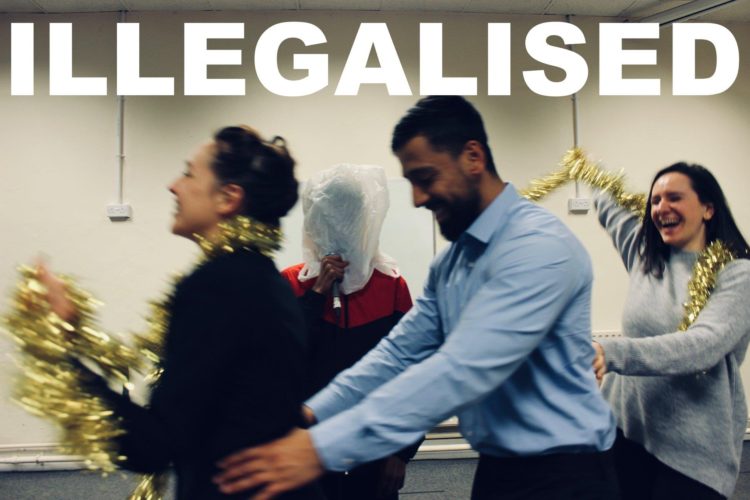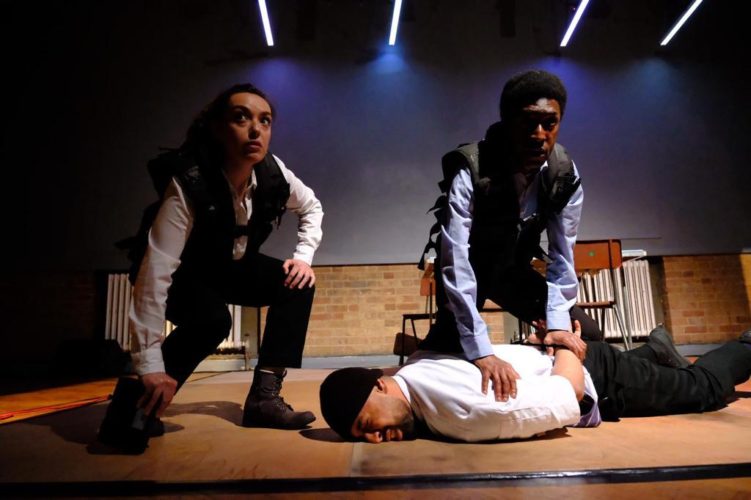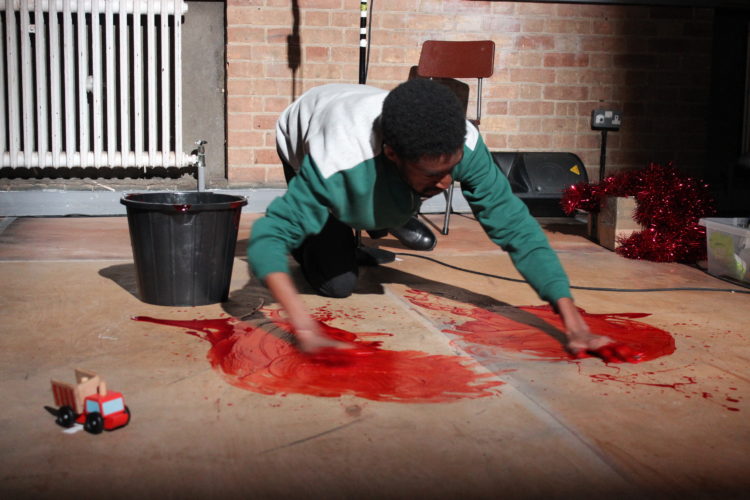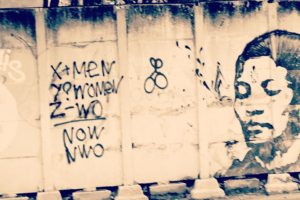You enter Camden People’s Theater, and you feel a bit strange. It looks like Macaz, but not really. The theater’s employees smile at you, but you do not like it. You remember that they say that in socialism no one was smiling at you. That’s how the westerners won the Cold War, they smiled and won.
They smile but they not win now. You feel a bit annoyed.
You remember that non-binary people who work at Macaz do not see your gender. And do not smile, and do not want to make you feel better. Here you feel heterogenderized. You are in an alternative world, a dystopia, a Macaz that was part of the British Empire for a long time. They smile, and you do not smile back.
The play starts on time which is weird. The actors are good and real, and you love their rage and talent. You are mostly surrounded by London people, you assume. Not many reactions.
You hear an actress mocking everything English with sheer pleasure. You laugh and love it. All the bodies around you, they seem contained, and focused, and attentive. In the play, you see an African emigrant body being badly treated by British police, an immigrant Romanian woman navigating her half-white status, and English feminized bodies deriving pleasure from enforcing laws. You laugh at the absurdity of the whole thing.
You start to feel angry but you also feel like you are enjoying it.
You sound like you are the only one who’s loudly enjoying the performance. But everything is mechanic and sounds like an well-oiled clock.
You feel like you are thirsty. You are taking drugs to keep you functional, and you go out. On the other side of the street a Sainsbury. When you leave a character is mocking the violence of English politeness and rule enforcement, which are masks for violent social control. See it, say it, sort it, you think, the sort of British policing that led to you speaking English right now. You get into Sainsbury, your face is on the shop’s camera. You look like you are part of a recording, and you are already an intruder. You buy your water, go to the automatic pay machines. They also have cameras on the machines, you look at yourself again, you are illegal.
You realize that inside the play (which is yes, an overblown dystopia), you feel less controlled than you are when you walk on the streets in Camden.
You are surveilled, you feel like you want to wear a mask. You ask yourself, do I need a play to remind myself that I am surveilled? And then you think, well, Africans die in this play, but they also re-appear as ghosts crashing Home Office parties. And Romanian immigrants are washing their blood, because they are hired as cheap labor. The actor playing the Romanian immigrant is giving you a feel for the real thing, they shout at at the audience: “Easterners, the toilet of Europe”. You are not washing toilets but you understand that you fall in that category in the mind of a lot of people around you. And the English go on and enforce rules because this is how you civilize others and bring progress. And give them infrastructure, and roads, and kindergartens.
You see three worlds: the politeness of the British, a mechanism for global control; the rage of the half-white working class, a mechanism for some sort of psychological relief; and the death of African refugees, a mechanism to repeat again that blackness is the equivalent of death, which is pretty fucked up in itself.
Not much of a political alliance here, the roles are given and is hard to get out from their embrace.
And then I talk to my friend, next to me, on a subway trip and they tell me, well, the English do rage but their rage is directed neither against the system nor against inequaliy. The rage is all the time about those who are not playing by the rules. This is how they express discontent when others are not willingly and merrily playing their part in a system meant to preserve the privileges of the upper class English people and multiply the ones of the wannabes. They do irony as a mild and gentle reminder that they are special. They cannot be rude and shout, shouting is for the working class. They are the ones who are desperate, not us.
We, the English, are just special because we understand that this is how the system works.
I nod, my friend is very sharp, but can we get out of the roles that this political play ascribes to us?
And my friend tells me again, you know, the Romanian cleaning person, she does not really admire whiteness, even though she tells her mom on the phone in a Moldovian accent that she likes this English world, they treat her well, they all wear suites. This is just her coping, my friend tells me, she already knows that she can not make it if she does not buy the story they sell. She hangs in there day after day because she wants to send money to her child. Only when she sees the spilt blood of the African refugee, can she voice what she feels, that this world is extracting labor from her while at the same time fearing her, despising and rejecting her. The dangled carrot of „humanity” seemingly attainable by moving more to the West remains out of reach.
It is good to talk with my friend. Sainsbury is very scary. As if it were not enough that they take your photo all the time, they take your shoes off at the airport, they search you when you move between countries. In Sainsbury, you are in an upper class world, you are moving from one border to another. You are thief already if you do not do what they ask you to do.
But, as always, they underestimate what you can do, and this play is not far from doing that as well. You are stronger than they think you are.
Illegalized, A BÉZNĂ Theatre production, with Lizzie Clarke, Theo Green, Ahmad Sakhi, Oana Cristina Puscatu, written&directed by Sînziana Koenig & Nico Vaccari.




Comments are closed here.